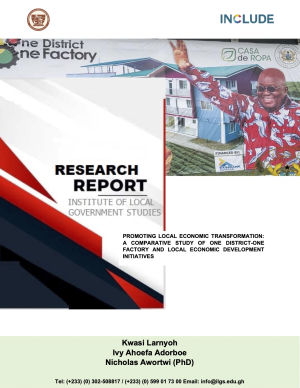
This report highlights the crucial role that industrial policy plays in generating real economic growth and structural transformation in developing countries. The report, developed by the Institute of Local Government Studies, assesses the extent of job creation and enterprise development intervention of the One District One Factory (1D1F) initiative and the success factors and pitfalls in its implementation. In Ghana, industrialisation strategies based on import substitution industrialisation, liberalized industrialisation and value-added processing have not led to fundamental economic transformation. The current decentralisation policy makes district assemblies responsible for the overall development of their jurisdictions and implementation of the 1D1F initiative. The report shows that key factors which contributed to the success of the 1D1F initiative were collaboration, coordination, commitment, capacity, context-specificity, and communication and feedback mechanisms, commitment by top level (political) leadership and entrepreneurs’ access to affordable finances. The findings also show that the use of local resources in production, especially in agro-processing, promotes local job creation. To enhance the role of district assemblies in industrialisation and employment creation, this report recommends the need for deeper coordination at the district level and district assemblies to adopt a “One Area, One Product” (1A1P) strategy where they lead, coordinate and facilitate the development of viable local products.




